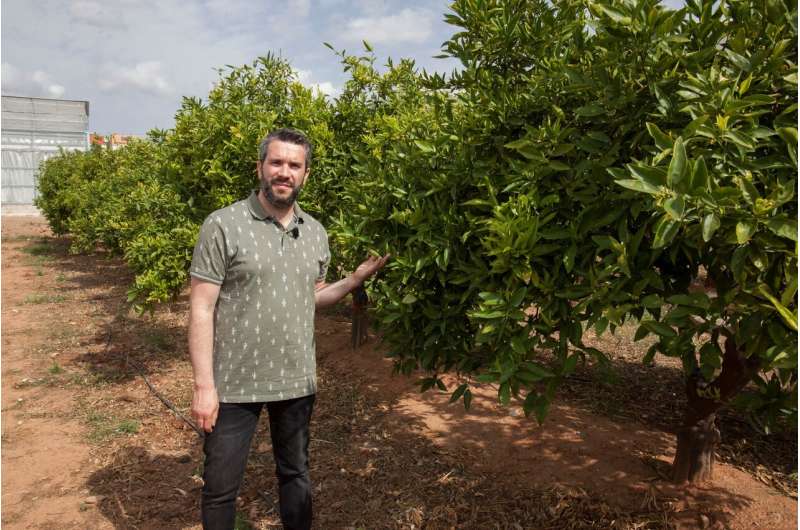Climate change puts commercial viability of citrus, vineyards and olive trees at risk

Climate change threatens the medium-term commercial viability of citrus fruits, vines and olives. A study by the Ecophysiology and Biotechnology research group at the Universitat Jaume I de Castelló (UJI) - carried out in collaboration with scientists from France, Greece and the United Kingdom—warns that the effects of global warming will reduce the productivity of these three species of traditional and iconic fruit trees in the Mediterranean area. The conclusions of this review are published in the journal Frontiers in Plant Science.
Vicente Arbona, lecturer in the Department of Agricultural and Environmental Sciences, coordinator of this study and also a member of the Interdisciplinary Seminar on Climate Change Research at the UJI, argues that this phenomenon "will not only cause a drop in the productivity of iconic species such as citrus fruits, vines and olives, but also, the increase in temperatures or the water deficit will affect their commercial competitiveness." In addition, the expected variations in the territory of Castellón, the Valencian Community and the Mediterranean area as a whole, which is particularly vulnerable, "will affect the phenology of these fruit trees, altering their patterns for sprouting, flowering, giving and ripening the fruit."
Another important aspect is the quality of the fruit, which is key to its commercial viability. In citrus, high temperatures alter the balance between sugars and acids, giving rise to fruit without its characteristic acidic touch, "as can be seen in those from tropical regions," according to UJI researchers. In the olive tree, the impact can be "more dramatic," in the opinion of experts, because although it is a crop very well adapted to Mediterranean conditions, the combined action of lack of rain and high thermal values in autumn and early spring determines the flowering period and its intensity. In fact, "the flowering of this species can be advanced up to 17 days at the same time as reducing the percentage of fruit set and, therefore, production," commented the Ecophysiology and Biotechnology group.
These alterations during the period in which they sprout or flower will have a different effect on pollinating insects: so much so that "a desynchronisation between the cycles of one and the other can occur, as has already been observed between some herbaceous species and their natural pollinators, drones, with their consequent effect on the productivity of the fruit trees," says Arbona.
The tools of biotechnology
The principal author of the work, Carlos de Olla, underlines that the perspectives of climatic variation in the Mediterranean basin and its impact on agriculture "show the relevance of biotechnology as a fundamental discipline in the production of fruit trees with better characteristics that allow them to maintain and even improve their productivity and quality." "The genome sequencing projects of these species of fruit trees have enabled the selection process of variants to be speeded up and the time needed to obtain new varieties using classic genetic improvement strategies to be shortened, making it a priority area in agricultural research," the scientist adds.
The work led by the UJI recently published in Frontiers in Plant Science also shows the importance of so-called omic techniques as fundamental tools for the study of plant variability and response mechanisms to environmental stresses. For example, these tools, as Vicente Arbona states, "help us to find out the interactions that, at a molecular level, control these responses and to correlate genetic and metabolic variations with a given behavior or phenotype to identify key regulators, susceptible to the biotechnological improvement of agricultural species."
On the other hand, the Ecophysiology and Biotechnology research group has recently participated in a study that has revealed how agricultural biodiversity is a useful tool to combat pests and the effects of climate change on crops. The results of the work showed that the conservation of traditional varieties mitigates the effects of water deficit and the damage caused by the red spider mite.
These scientists were also pioneers in analyzing the collective impact of two fundamental stresses linked to climate change on citrus cultivation: drought and heat, to advance the formulation of tools to tackle global warming. The study delved into these parameters and hormonal regulation in the two most common patterns used in citrus, Citran Carrizo foot and Cleopatra mandarin. Moreover, he concluded that the first—the one used in most of the citrus varieties grown in the Valencian countryside—seems to be more tolerant of the combination of drought and heat.
Professor Aurelio Gómez Cadenas directs the research group in Ecophysiology and Biotechnology. Its research lines include, among others, the responses and tolerance mechanisms of citrus and other crops to abiotic and biotic stresses and their combination, such as droughts, floods, salinity or infestation by the red spider, and its hormonal control. In addition, the group applies biotechnology techniques such as in vitro culture and determines the metabolic changes of plants in response to stress.
More information: Carlos De Ollas et al. Facing Climate Change: Biotechnology of Iconic Mediterranean Woody Crops, Frontiers in Plant Science (2019). DOI: 10.3389/fpls.2019.00427
Provided by Asociacion RUVID

















